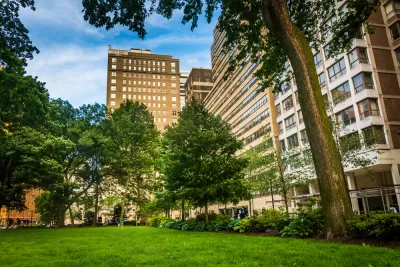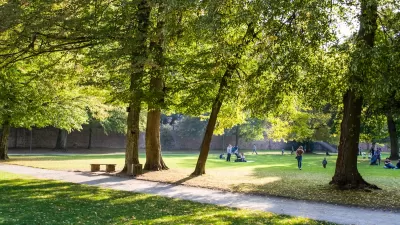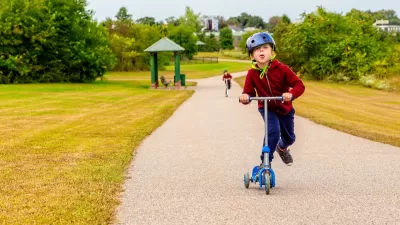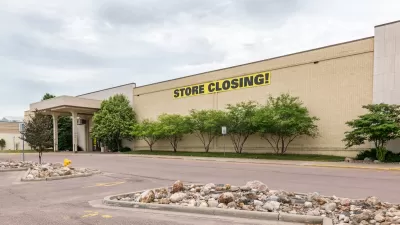The 2022 ParkScore finds that cities are increasingly employing green space as a tool for mitigating heat and extreme weather effects, but the distribution of parks remains inequitable.

A blog post from the Trust for Public Land outlines the importance of urban parks in slowing and mitigating the effects of climate change. “Many American cities have committed to slashing carbon emissions. Increasingly, they are also trying to make themselves more resilient, adapting streetscapes and green spaces to counter the worst effects of extreme heat and violent storms.” The blog calls parks a vital component of this effort. “Green space has the power to lower air temperature and absorb floodwater and can be designed in a way that enhances those benefits. That’s especially important for disadvantaged communities, whose vulnerable populations are most at risk as the Earth warms.”
The blog highlights key findings of their 2022 ParkScore® index, including that “Eighty-five percent of cities are adapting parks and recreation facilities to address climate change” and “Seventy-seven percent are enlisting parks to counter urban heat.”
The analysis also uncovered inequities in park distribution. “Our analysis found that the neighborhoods where most residents identify as people of color have access to an average of 43 percent less park acreage than mostly white neighborhoods.”
The blog concludes that more investment is needed to combat climate change and protect the most vulnerable communities. “Congress, state governments, and city councils all must redouble efforts to finance green infrastructure in order to protect communities—especially those that need parks most.”
FULL STORY: 2022 ParkScore report reveals the power of parks to address climate change

Study: Maui’s Plan to Convert Vacation Rentals to Long-Term Housing Could Cause Nearly $1 Billion Economic Loss
The plan would reduce visitor accommodation by 25,% resulting in 1,900 jobs lost.

North Texas Transit Leaders Tout Benefits of TOD for Growing Region
At a summit focused on transit-oriented development, policymakers discussed how North Texas’ expanded light rail system can serve as a tool for economic growth.

Why Should We Subsidize Public Transportation?
Many public transit agencies face financial stress due to rising costs, declining fare revenue, and declining subsidies. Transit advocates must provide a strong business case for increasing public transit funding.

How to Make US Trains Faster
Changes to boarding platforms and a switch to electric trains could improve U.S. passenger rail service without the added cost of high-speed rail.

Columbia’s Revitalized ‘Loop’ Is a Hub for Local Entrepreneurs
A focus on small businesses is helping a commercial corridor in Columbia, Missouri thrive.

Invasive Insect Threatens Minnesota’s Ash Forests
The Emerald Ash Borer is a rapidly spreading invasive pest threatening Minnesota’s ash trees, and homeowners are encouraged to plant diverse replacement species, avoid moving ash firewood, and monitor for signs of infestation.
Urban Design for Planners 1: Software Tools
This six-course series explores essential urban design concepts using open source software and equips planners with the tools they need to participate fully in the urban design process.
Planning for Universal Design
Learn the tools for implementing Universal Design in planning regulations.
Ascent Environmental
Borough of Carlisle
Institute for Housing and Urban Development Studies (IHS)
City of Grandview
Harvard GSD Executive Education
Toledo-Lucas County Plan Commissions
Salt Lake City
NYU Wagner Graduate School of Public Service





























